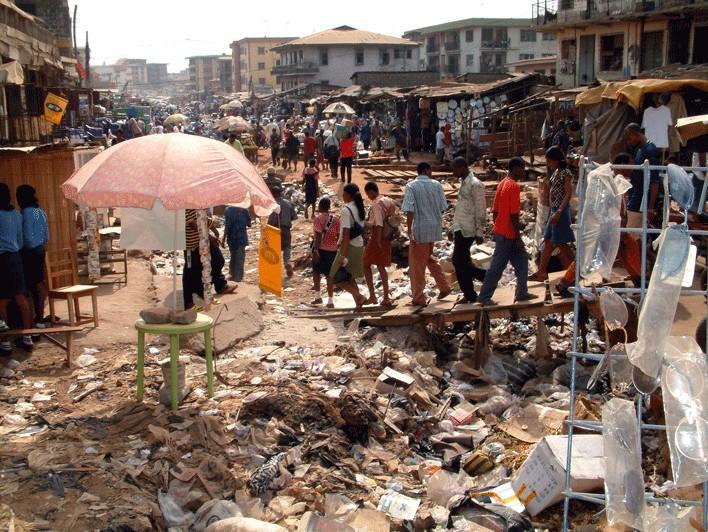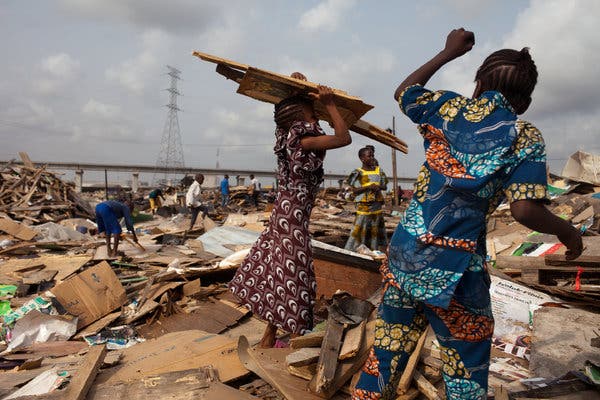Dear Beamers,
Greetings!
Many Nigerians live in informal settlements with limited or no access to basic services. Each day passes with their primary focus on survival; any additional improvements are celebrated with great enthusiasm. The arrival of new immigrants daily in already overcrowded suburbs, seeking better opportunities, exacerbates the strain on the poor living conditions. Comprehensive action is necessary to address the interconnected social, environmental, and health issues threatening lives in the slums. Hence, this week’s newsletter focuses on addressing the disparities in access to basic needs for slum families.
Nigeria, a country rich in diverse cultures, traditions, and tribes, faces a significant challenge: the existence of slums. These areas are characterized by dwellings that are unfit for human habitation due to dilapidation, overcrowding, and lack of ventilation or sanitation facilities. It is disheartening that Nigeria, already grappling with security and economic challenges, must also contend with its citizens struggling with poverty, malnutrition, disease, and unhealthy conditions in the slums, which alone contribute to the deaths of both the young and the elderly.
The emergence of slums in Nigeria can be attributed to a multitude of interrelated factors that create this challenging living environment. One significant factor contributing to slum formation is urbanization. The rapid urbanization trend in Nigeria has led to large-scale migration from rural areas to cities in search of better economic opportunities. As a result, slums have become an inevitable part of modern urbanization, with the urban poor actively contributing to economic growth by serving the non-slum dwellers. These settlements are characterized by inadequate housing and basic services. These pockets of poverty and marginalization are widespread in urban areas and serve as a stark reminder of the complex socio-economic issues facing the nation.
Konju Williams believes that the inability of urban centers to provide affordable housing drives people to move into slums. In his words,
“The inability of cities to provide affordable housing is one of the biggest cause slum formation. High property prices and rents, with limited formal housing options, force many to live in any available dwellings in slum areas. Everyone wants a comfortable home, but people have to consider their finances first. That’s why many choose to live in slums based on what they can afford, at least until they can get a better job to meet their needs, which sadly, some never achieve.”
The rise of slums is directly proportional to increasing urbanization, with resources failing to keep pace with the demands of a growing population. This rapid growth has led to an unprecedented demand for land. Consequently, it is common to see undeveloped land being taken over by rural immigrants, resulting in the uncontrolled and unorganized development of slum communities. These areas typically lack basic infrastructural facilities and are characterized by extremely poor environmental conditions.
In other words, the formation of slums has become prevalent in Nigerian cities, where the urban population growth rate surpasses economic growth and outpaces the capacity of the country’s health and social services to provide adequate care. These regions experience a wide range of low-income settlements and poor living conditions, including vast informal settlements that are increasingly becoming the most visible manifestation of urban poverty.
Urbanization is also transforming the structures and functions of various social institutions. It alters the role of the family, demographic structures, the nature of work, and living arrangements. Rising poverty levels have been further exacerbated by unemployment, underemployment, decreased wages due to persistent inflation, and uncontrolled rural-to-urban migration. These factors result in poverty and poor health outcomes, particularly among the urban poor who live below the poverty line with limited access to social and health care services. Increasing urbanization without corresponding opportunities has forced some individuals to move to lower-income areas where their earnings only suffice to meet basic needs, far from the affluent zones they once could afford. As a result of this relocation, some must learn or engage in new jobs that meet the demands of these areas, cementing their settlement in the slums as they start anew in their efforts to improve their circumstances.
Ighagbon Testimony shares his life experience in the slum. In his words,
“I’ve lived in this slum for over 14 years, and nothing has changed. There’s no improvement, no healthcare, no renovations, and no new schools from the government. More people keep moving in because they can’t afford to live in places with good water, drainage, or environment. We live with constant complaints, and as soon as you tell people you’re from Ajegunle, they assume you’re poor and living an unhygienic life. We’re done asking the government for help. As long as I can provide for my family, we’ll keep fighting until I have enough money to move them to a better place.”
Ayomide Alao, a resident of Ajegunle, Lagos, emphasizes the importance of empowering slum dwellers to help them discover a meaningful life. In his words,
“Empowerment will help slum dwellers expand their assets and enable them to participate in, negotiate with, influence, and hold accountable the institutions that affect their lives. It will give them independence and the drive to increase their capacity to make choices and turn those choices into desired actions and outcomes. Empowerment will really really help them build individual and collective assets. It will lead to social capital, neighborhood bonding, and a sense of community.”

Residents of slums face several challenges across various aspects of life. The overcrowded and unsanitary conditions prevalent in these areas contribute significantly to environmental degradation. Improper waste disposal and inadequate sewage systems result in pollution and health hazards. Moreover, slums often lack access to clean water, proper sanitation facilities, and adequate healthcare services, leading to the rapid spread of diseases and posing significant public health risks. These conditions make informal settlements fertile grounds for diseases such as tuberculosis, hepatitis, dengue, pneumonia, malaria, cholera, and diarrheal diseases. Additionally, urban slum dwellers are at heightened risk of non-communicable diseases like asthma, heart disease, diabetes, and mental health disorders such as anxiety, depression, insomnia, and substance abuse. This vulnerability stems from adopting urban lifestyles without sufficient knowledge and access to healthcare resources.
Living in slums under conditions of urban poverty significantly contributes to poor health outcomes. Addressing this issue aligns with several Millennium Development Goals (MDGs), including reducing child mortality (Goal 4), improving maternal health (Goal 5), combating diseases such as HIV/AIDS, malaria, and others (Goal 6), and ensuring environmental sustainability (Goal 7). It is important for the Nigerian government to take decisive action to effectively manage and mitigate this global concern within our nation.
Furthermore, the housing conditions available to slum dwellers exacerbate their living standards. Durable housing should ideally be located in safe areas and constructed with permanent structures capable of shielding inhabitants from environmental elements such as rain, heat, and cold. Slum dwellers, both young and old, often endure cardiovascular and respiratory ailments exacerbated by fluctuating indoor temperatures. These dwellings are typically situated in inhospitable environments, characterized by dampness, which not only fosters the breeding of pests like rats, mice, flies, and cockroaches but also contributes to the spread of infectious diseases and allergens. Moreover, slum residences are prone to natural disasters such as floods and landslides due to their location in low-lying areas. Moreover, some slums contain hazardous waste landfill sites that pose risks such as low birth weight, birth defects, infectious diseases, and cancers.
Some slum houses are densely populated with multiple family members and/or friends, leading to overcrowding in inadequate living spaces. This overcrowding has been associated with an increase in negative social behaviors such as domestic violence and child abuse. The lack of space for studying or doing homework directly impacts children’s education outcomes. Living in cramped quarters with inadequate ventilation and hygiene increases the risk of respiratory infections and exposure to environmental contaminants.
Children in slums face multiple underserved challenges, particularly concerning access to quality education. Limited availability of schools and resources, combined with economic pressures that often compel children to contribute to family income, significantly impede their educational progress. Many schools are housed in deteriorating structures or even operate under makeshift arrangements, lacking adequate attention, educational opportunities, or government funding. Instruction often relies on limited materials and resources, delivered by underqualified, low-paid teachers using outdated textbooks and non-standardized curricula. Consequently, children from slums struggle to keep pace with their peers in more developed areas of the country, perpetuating cycles of educational disadvantage and contributing to ongoing issues of brain drain within the community.
Focusing on improving access to quality education and skill development programs in slum areas represents a crucial investment in the future of these children. Empowering residents through education and training can significantly enhance their employability and break the cycle of poverty. The adage that “children are the leaders of tomorrow” underscores the critical importance of preparing today’s youth for future responsibilities. Nigeria’s present challenges are rooted in past decisions, highlighting the urgency of equipping today’s children with academic excellence and practical skills to responsibly lead the nation’s growth in the years ahead.
Comrade Olaonipekun Martins believes that addressing the challenges faced by slum dwellers requires a concerted effort towards proper urban planning and infrastructure development. In his words,
“To provide lasting solutions for slum dwellers, proper urban planning and infrastructure development are essential. The government and NGOs should invest in urban planning that prioritizes affordable housing, proper infrastructure, and sustainable development. Upgrading existing slums with better housing and amenities can improve living conditions. There should also be a noticeable increase in healthcare facilities and awareness in slum areas to address health challenges. Preventive measures, such as clean water and sanitation initiatives, can reduce health risks.”
To foster inclusivity in Nigeria’s slums, a comprehensive approach to slum upgrading is essential. This process must involve local governments through political commitment, institutional reform, capacity building, partnership-driven planning, innovative projects, infrastructure enhancement, health promotion initiatives, and community participation in health development.

Efforts to upgrade slums for improved living conditions should prioritize enhancing security of tenure through land rights regularization and improving access to essential services. This includes provisions for clean water, energy for cooking and lighting, drainage systems, security lighting, environmental hazard mitigation, incentives for community management, improved healthcare and education access, and livelihood enhancement through vocational training and microcredits. New housing developments should incorporate essential facilities from the outset, including individual household toilets to promote personal hygiene. This comprehensive approach should be implemented with careful consideration of the concerns, needs, and aspirations of impoverished slum dwellers.
To address the health challenges faced by urban slum dwellers effectively, governments should implement comprehensive interventions that address interconnected issues rather than focusing solely on isolated curative or preventive measures. Implementing “intervention packages” that simultaneously improve health service delivery, environmental sanitation, personal hygiene, healthcare-seeking behavior, and livelihood opportunities is likely to yield greater impact. It is crucial that all levels of government in Nigeria develop sustainable development strategies and infrastructure plans to transform slums into sustainable communities.
“Look at the advancements in other African nations; they’ve made much more progress compared to Nigeria. The proportion of people living in extreme poverty has decreased, more children are going to school, child mortality has declined, diseases are better controlled, and people are living happier lives. It feels like our nation is battling a terrible curse.” says Joy Oyibode
The challenges presented by Nigeria’s slums are complex and demand comprehensive, compassionate solutions to ensure widespread equality and improved quality of life across the nation. Addressing these issues at their core requires collaborative efforts involving not just the government, but also non-governmental organizations and society as a whole. Through such collective action, we can aim for a more inclusive and equitable future for Nigeria.




